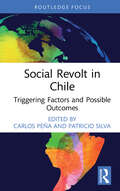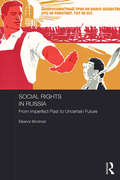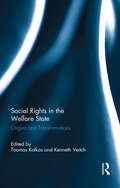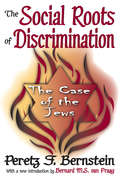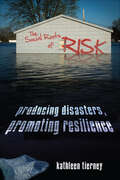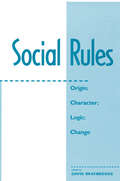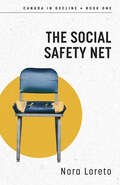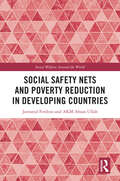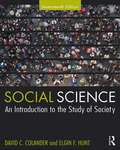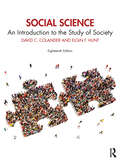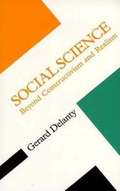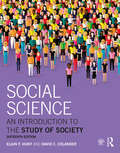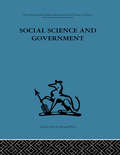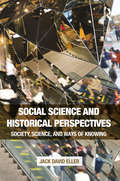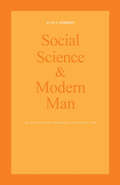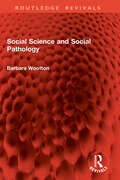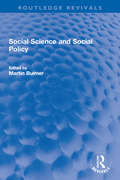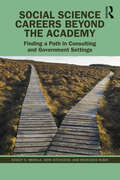- Table View
- List View
Social Revolt in Chile: Triggering Factors and Possible Outcomes (Routledge Studies in Latin American Development)
by Carlos Peña Patricio SilvaThis book investigates why Chile suddenly confronted a violent social revolt in October 2019, after almost thirty years of political stability, during which time the country was broadly regarded as Latin America’s most successful nation. Since democratic restoration in 1990, Chile’s relatively high levels of political stability, increasing prosperity and social modernisation have stood out in a region shaken by political convulsion and economic malaise. In early October 2019, President Sebastián Piñera confidently claimed that Chile represented a true ‘oasis’ of political stability and economic vitality in Latin America. However, just weeks later, the announcement of a small increase in the price of Santiago’s underground transport system unleashed an unprecedented wave of violent anti-government protests in the country, with protestors ultimately demanding Piñera’s resignation and the end of neoliberalism and the 1980 Constitution, among many other demands. This book analyses the causes of Chile’s socio-political upheaval, arguing that the fast social and economic modernisation produced by the neoliberal system led to a series of destabilising socio-political processes in the country. At a time when much analysis of the October uprising tends to be superficial or polarised on ideological grounds, this book provides a much-needed sociological and institutional analysis of the crisis. It will be an important read for scholars of Latin American politics and development, as well as those with a broader interest in state legitimacy, social movements and political contestation against neoliberalism.
Social Rights in Russia: From Imperfect Past to Uncertain Future (BASEES/Routledge Series on Russian and East European Studies)
by Eleanor BindmanRussia's human rights record, especially violations of the right to life, liberty and freedom of expression, has been the subject of much international concern. Social, or welfare, rights, on the other hand, including the right to housing, health and access to social security, have received much less attention. This book explores the changing position in Russia towards such social rights. It explores how social rights are defined in Russia and why they are contested, and discusses how increasing liberalisation and privatisation have radically changed the very extensive former communist welfare system. It considers recent initiatives by both Putin and Medvedev to re-emphasise the role of the state in providing social services, and shows how activism to secure social benefits, especially at the local level, is relatively strong. The book concludes by assessing how social rights and welfare are likely to develop in Russia in a world increasingly concerned with austerity and the transformation of citizens into 'market citizens', where attitudes towards social rights remain less than favourable.
Social Rights in the Welfare State: Origins and Transformations
by Toomas Kotkas Kenneth VeitchAt a time when the future of the welfare state is the object of heated debate in many European countries, this edited collection explores the relationship between this institution and social rights. Structured around the themes of the politics of social rights, questions of equality and social exclusion/inclusion, and the increasing impact of market imperatives on social policy, the book explores the effect of transformations in the welfare state upon social rights and their underlying rationalities and logics. Written by a group of international scholars, many of the essays discuss a number of urgent and topical issues within social policy, including: the social rights of asylum seekers; the increasing marketization and consumerization of public welfare services; the care of the elderly; and the obligation to work as a condition of access to welfare benefits. International in its scope, and interdisciplinary in its approach, this collection of essays will appeal to scholars and students working in the fields of law and socio-legal studies, sociology, social policy, and politics. It will also be of interest to policy makers and all those engaged in the debate over the future of the welfare state and social rights.
The Social Roots of Discrimination: The Case of the Jews
by John W. ThibautThe Social Roots of Discrimination explains the phenomenon of anti-Semitism. In this classic volume, Peretz F. Bernstein looks for objective reasons why anti-Semitism flourished in European countries. Some civilized people would consider the notion of race uncivilized, but the existence of different races and the inequality of races with their specific race characteristics and on top of that the existence of superior and inferior human races was accepted as a fact of life and as a scientific truth long before the Nazis came to power. Although there is a marked difference in dealing with anti-Semitism in continental Europe in 1920 and the anti-Semitism in, for instance, the US in 2000, Berstein's ideas remain valuable.Starting from a concrete problem, anti-Semitism in Central Europe, Bernstein puts anti-Semitism in a general sociological theoretical framework. Far from limiting himself to fruitless elaborations on the common perceived unpleasant characteristics of Jews, he recognizes that the group is heterogeneous and that the usual arguments to justify anti-Semitism do not have any general validity, although they may hold for some specific individuals of the hated group, like individual members of any group may be less pleasant. Bernstein's ideas remain valuable.Bernstein tries to explain the hatred of Jews as the working of a more general mechanism--one that has nothing to do specifically with of Jews as a collective or as individuals. In doing so Bernstein attempts to sketch a general theory of social groups and conflicts between groups. The Social Roots of Discrimination gives an important message both for social scientists and for all intellectuals who are concerned with the strifes between nations, races, and social groups.
The Social Roots of Risk: Producing Disasters, Promoting Resilience (High Reliability and Crisis Management)
by Kathleen TierneyThe first decade of the 21st century saw a remarkable number of large-scale disasters. Earthquakes in Haiti and Sumatra underscored the serious economic consequences that catastrophic events can have on developing countries, while 9/11 and Hurricane Katrina showed that first world nations remain vulnerable. The Social Roots of Risk argues against the widespread notion that cataclysmic occurrences are singular events, driven by forces beyond our control. Instead, Kathleen Tierney contends that disasters of all types#151;be they natural, technological, or economic#151;are rooted in common social and institutional sources. Put another way, risks and disasters are produced by the social order itself#151;by governing bodies, organizations, and groups that push for economic growth, oppose risk-reducing regulation, and escape responsibility for tremendous losses when they occur. Considering a wide range of historical and looming events#151;from a potential mega-earthquake in Tokyo that would cause devastation far greater than what we saw in 2011, to BP's accident history prior to the 2010 blowout#151;Tierney illustrates trends in our behavior, connecting what seem like one-off events to illuminate historical patterns. Like risk, human resilience also emerges from the social order, and this book makes a powerful case that we already have a significant capacity to reduce the losses that disasters produce. A provocative rethinking of the way that we approach and remedy disasters, The Social Roots of Risk leaves readers with a better understanding of how our own actions make us vulnerable to the next big crisis#151;and what we can do to prevent it.
Social Rules: Origin; Character; Logic; Change (Toronto Studies In Philosophy)
by David BraybrookeThis collection is a pioneering effort to bring together in fruitful interaction the two dominant perspectives on social rules. One, shared by philosophers, lawyers, anthropologists, and sociologists, directly invites formalization by a logic of rules. The other, originating with economists, emphasizes cost considerations and invites mathematical treatment, often in game-theoretical models for problems of coordination?models that some philosophers have taken up as well.Each perspective is represented by new and recent work that moves this important topic toward increased conceptual precision and deeper insight. As a whole, the collection strikes a balance between historical illustrations and theoretical argument, offering in both a rich body of suggestions for further work.
The Social Safety Net: Canada in Decline Book One (Canada in Decline #1)
by Nora LoretoCanada’s social safety net is fraying. Why does it feel like everything is collapsing?Canada is at a crossroad. Neoliberalism has hollowed out and sold off the social services Canadians rely on now more than ever, and has brought into stark relief the dissonance among colonial, Indigenous, and some of Canada's most at-risk groups.The Social Safety Net tracks the forty-year attack on Canada’s social safety net. As neoliberalism has matured in Canada, Canadians are seeing the impact of these attacks: unreliable health services, crises in education and social services, and a society that feels like it is losing cohesion.The first volume in a series by activist, author, and journalist Nora Loreto, the Canada in Decline series is the story of Canada’s untenable status quo and the forces that have led us to where we are today. It outlines the choices we need to make as well as the possible paths forward to fix all that is crumbling around us.
Social Safety Nets and Poverty Reduction in Developing Countries (Social Welfare Around the World)
by Jannatul Ferdous AKM Ahsan UllahThis book investigates the origins, current state, and fundamental value of social safety nets in developing countries, as well as their effectiveness in these settings. Social safety net programs (SSNPs) are critical because they keep those who are already vulnerable from falling deeper into poverty. Analysing how social safety nets benefit the most disadvantaged and marginalized members of society by allowing those in need to become financially stable, more resilient, and open up more opportunities for themselves, this book shows that social safety nets (SSNs) are a collection of social services designed to protect people from the effects of economic and emotional hardship. Showing that the purpose of the safety net is not to provide permanent financial security, but rather to provide temporary financial security during periodic shocks and how this applies in South Asia and also in parts of Africa, this book will be of interest to all scholars and students of social policy, sociology, social work, and Global South politics more generally.
Social Science: An Introduction to the Study of Society (Alternative Etext Formats Ser.)
by David C. Colander Elgin F. HuntNow in its seventeenth edition, Social Science: An Introduction to the Study of Society approaches its study from a common-sense perspective, rather than a formalistic perspective more common in social science. Readers will see how seemingly diverse disciplines intermingle and connect to one another – anthropology and economics, for example. The goal of the book is to teach students critical thinking and problem-solving skills that will allow them to approach social issues in an objective and informed way. New to this edition are significant updates on: The election of Donald Trump and the emergence of related populist movements Trade policy and health care Issues involving migration and immigration Emerging developments in artificial intelligence Comparisons between cultural and biological evolution Examples, data, recommended readings, and internet questions
Social Science: An Introduction to the Study of Society
by David C. Colander Elgin F. HuntNow in its eigthteenth edition, Social Science: An Introduction to the Study of Society approaches its study from a common sense perspective, rather than a formalistic perspective more common in social science texts. Readers will see how seemingly diverse disciplines intermingle and connect to one another—anthropology and economics, for example. The goal of the book is to teach students critical thinking and problem-solving skills that will allow them to approach social issues in an objective and informed way. New to this edition are significant updates on: Debates about the limits of democracy, and the developing Chinese political alternative. Political, economic, and social implications of the Covid pandemic. Assessment of the Donald Trump presidency. Political, economic, and social implications of the movement from the Trump presidency to the Biden presidency. Implications of the multitrillion-dollar budget deficits the US government has been running. The emergence of populist movements throughout the world. The Chinese political and economic challenge to the United States. Recent developments in evolution theory. Examples, data, recommended readings, and Internet questions. Critical thinking questions.
Social Science: Beyond Constructivism and Realism
by Gerard DelantyThis concise and comprehensive volume provides an accessible overview of the main debates on the sociology and philosophy of the social sciences. Exploring the changing conceptions of social science from the 16th century to today, sociologist Gerard Delanty argues how this group of disciplines is recovering its role as the critical voice of modernity.
Social Science: An Introduction to the Study of Society
by Elgin F. Hunt David C. ColanderSocial Science: An Introduction to the Study of Society 16e approaches social science from a common-sense perspective, rather than from a conventional social science angle. Readers will see how seemingly diverse disciplines intermingle – anthropology and economics, for example. The goal of the book is to teach?students critical thought and problem solving skills that will allow them?to approach social issues in an?unbiased manner. ? New to this edition are significant?updates on: ? Race and the police More comparison/contrasts of deviance and criminality Alternative pathways in criminal justice new technology such as self-driving cars Gay marriage American political dynasties Refugee and immigration issues in Europe & globally American political dynasties China’s growing power New trade initiatives "States" in the Middle East Nuclear arms control? Expanded web-based ancillaries for students and teachers
Social Science 1 Part 1 class 10 - S.C.E.R.T. - Kerala Board
by State Council of Educational Research Training KeralaSocial Science I (Part-I) text book for 10th standard from State Council of Educational Research and Training (S.C.E.R.T.) Kerala in English.
Social Science 10th Standard - Tamilnadu Board
by State Council of Educational Research TrainingSocial Science Textbook for the 10th Standard Students, preparing for Tamil Nadu State Board Exam.
Social Science 2 Part 2 class 10 - S.C.E.R.T. - Kerala board
by State Council of Educational Research and TrainingThe lessons in this book for Class X are so arranged as to help familiarize the physiography, climate, and soil of our country, and to develop a general awareness on the use of the potentials of modern technology in geography. This textbook also discusses concepts like the society in which we regularly interact, the economic transactions in the society, banks and their functions, and national income.
Social Science and Government: Policies and problems (International Behavioural And Social Sciences Ser. #Vol. 104)
by A B Cherns R Sinclair W I JenkinsTavistock Press was established as a co-operative venture between the Tavistock Institute and Routledge & Kegan Paul (RKP) in the 1950s to produce a series of major contributions across the social sciences. This volume is part of a 2001 reissue of a selection of those important works which have since gone out of print, or are difficult to locate. Published by Routledge, 112 volumes in total are being brought together under the name The International Behavioural and Social Sciences Library: Classics from the Tavistock Press. Reproduced here in facsimile, this volume was originally published in 1972 and is available individually. The collection is also available in a number of themed mini-sets of between 5 and 13 volumes, or as a complete collection.
Social Science and Historical Perspectives: Society, Science, and Ways of Knowing
by Jack David EllerThis accessible book introduces the story of ‘social science’, with coverage of history, politics, economics, sociology, psychology, anthropology, and geography. Key questions include: How and why did the social sciences originate and differentiate? How are they related to older traditions that have defined Western civilization? What is the unique perspective or ‘way of knowing’ of each social science? What are the challenges—and alternatives—to the social sciences as they stand in the twenty-first century? Eller explains the origin, evolution, methods, and the main figures, literature, concepts, and theories in each discipline. The chapters also feature a range of contemporary examples, with consideration given to how the disciplines address present-day issues.
Social Science and Modern Man: Alan B. Plaunt Memorial Lectures 1969
by Scott GordonThe main theme of these lectures is man's struggle to understand himself as a social being. The author argues that the chief inspiration for this effort, insofar as it has been successful, has been the rationalist philosophy of physical science, and that constructive social science has been based on this philosophy rather than upon theology and ethical philosophy. He goes on to discuss the major problems confronting man in his attempts to come to grips with the modern social world - problems of social and political organization, of equality and aspiration, of intellect and reason - and ends with a plea for liberalism and rationalism as the political and intellectual foundations of freedom and progress. This fascinating and thought-provoking apology for liberalism and the social scientist will be valuable reading for anyone interested in problems facing them both today.
Social Science and Social Pathology (Routledge Revivals)
by Barbara WoottonOriginally published in 1959, this book critically examines, in the light of numerous research, both the relation between unacceptable behaviour and economic and social status and the validity of several popular hypotheses of the 20th Century: that anti-social attitudes are due to lack of maternal affection in infancy, or that problem families produce problem families generation after generation. The author discusses the factors affecting the growth of modern psychiatry and how this shaped attitudes towards anti-social behaviour and conceptions of social work. The final section of the book considers the wider methodological implications.
Social Science and Social Policy (Routledge Revivals)
by Martin BulmerFirst published in 1986, Social Science and Social Policy addresses major questions concerned with the social utility of social science. The book is divided into four parts. The first part considers the place of social science in the policy-making process and criticizes the rational model which gives a central place to analysis. In part two, five different methodologies for policy research are considered: the use of continuous surveys, public opinion polls, social indicators, evaluation research and social experimentations and the use of qualitative methods. The advantages and drawbacks of each are considered with extensive use of examples. In the third part, the role of theory is examined. Particular attention is paid to the issue of health inequality. In part four, general questions are raised about the use and abuse of social science, including questions about how it can be most effectively disseminated to make maximum impact. The book is aimed at a general readership and requires no special methodological expertise. It will appeal particularly to undergraduates and graduate students taking courses in social policy, public policy applied sociology and a range of applied social sciences such as criminology, health studies, education and social work.
Social Science As Moral Inquiry
by Norma Haan Robert N. Bellah Paul Rabinow William SullivanThe papers in this volume arise out of a sense of unease shared in greater or lesser degree by all the contributors. The unease concerns first of all the relation of social science as presently practiced to the realm of ethics. "Value neutrality," itself a term far from clear, now seems without foundation as a guide in this area, but no forceful alternative has yet gathered a consensus. But the unease, among a number of the contributors, goes deeper than a worry about the moral meaning of social science. It includes a worry about the moral meaning of modern society itself. Social science and modern society were born together and their fates are deeply intertwined.
Social Science Careers Beyond the Academy: Finding a Path in Consulting and Government Settings
by Stacey S. Merola John Hitchcock Mercedes RubioSocial Science Careers Beyond the Academy provides a “road-map” to a career outside of academia for students of the social sciences who want to transition to a corporate or government environment after they complete their studies. It isn’t always easy to see how the skills you develop in academia will apply to corporate consultancy or research positions, or even to see clearly where these various career paths might lead and whether they might suit you. Are you a start-up person or would a big, established organization provide you with more opportunities? Public or private firm? Are you better at research or project management? How do you go about adapting your writing to the non-specialist audience of colleagues in an organization? This book is written by a team of authors who straddle the line that separates academia from consultancy work and have mentored countless students to make a successful transition to the working world. They identify and categorize various popular paths that are available to you; describe the types of organization, roles, and what they involve; and show how to map your own skills, personality, and preferences to the jobs you might aspire to. This book is the ultimate guide to building your path to success after you conclude your studies. This book is ideal for social science students looking to make their next steps after academia.
Social Science class 10 - Karnataka Board: ಸಮಾಜ ವಿಜ್ಞಾನ 10 ನೇ ತರಗತಿ - ಕರ್ನಾಟಕ ಮಂಡಳಿ
by Karnataka Patyapusthaka Sangha - karnataka boardSocial Science text book for 10th standard kannada medium, Karnataka Sate
Social Science class 8 - Tamil Nadu Board: சமூக அறிவியல் எட்டாம் வகுப்பு
by State Council of Educational Research and Training Tamil Naduதமிழ்நாடு வகுப்பு 8 சமூக அறிவியல் பாடம் புத்தகம் இந்தியா மற்றும் உலகின் வரலாறு, பொருளாதாரம், குடிமக்கள் மற்றும் இயற்கை வளங்களை பற்றிய விரிவான தகவல்களை உள்ளடக்கியுள்ளது. இதில் இந்தியாவில் ஐரோப்பிய நாடுகளின் வரலாற்று தாக்கம், இந்திய விடுதலைப் போராட்டம் மற்றும் அதன் முக்கிய நிகழ்வுகள் விளக்கப்படுகின்றன. புவியியல் பகுதிகள் நிலப்பரப்பின் அமைப்பு, வளங்கள் மற்றும் வேளாண்மையின் முக்கியத்துவத்தை பற்றி விவரிக்கின்றன. அரசியலியல் மற்றும் அரசின் செயல்பாடுகள், இந்திய அரசியலமைப்பின் முக்கியத்துவம், மக்களின் உரிமைகள் மற்றும் கடமைகளும் இந்தப் புத்தகத்தில் உள்ளன. பொருளாதாரம், உலகளாவிய வேக மாற்றங்கள் மற்றும் இந்திய பொருளாதாரத்தில் பணம் மற்றும் கடன் அமைப்புகள் பற்றி மாணவர்களுக்கு விளக்கம் அளிக்கப்படுகிறது
Social Science class 9 - GSTB
by Gujarat State Board of School TextbooksThe Board expresses the pleasure to publish the Textbook of Social Science for Std. 9 which is a translated version of Gujarati language.
